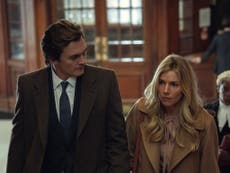Russian Doll, season two review: New iteration is just as dynamic and existentially curious
Second season is less a Russian doll than a Fabergé egg – gilded, ornate, and almost ostentatiously clever

Your support helps us to tell the story
From reproductive rights to climate change to Big Tech, The Independent is on the ground when the story is developing. Whether it's investigating the financials of Elon Musk's pro-Trump PAC or producing our latest documentary, 'The A Word', which shines a light on the American women fighting for reproductive rights, we know how important it is to parse out the facts from the messaging.
At such a critical moment in US history, we need reporters on the ground. Your donation allows us to keep sending journalists to speak to both sides of the story.
The Independent is trusted by Americans across the entire political spectrum. And unlike many other quality news outlets, we choose not to lock Americans out of our reporting and analysis with paywalls. We believe quality journalism should be available to everyone, paid for by those who can afford it.
Your support makes all the difference.The idea of “high-concept” television is nothing new. It dates all the way back to the early days ofThe Twilight Zone, those self-contained episodes that hinged on an intriguing but simple proposition. What if the Earth moved closer and closer to the sun, until the oceans began to boil? What if you saw your doppelgänger at a bus stop? What if you looked out your plane window and saw a monster? These ideas are the height of “high-concept”, as was the first season of Netflix’s acclaimed comedy-drama Russian Doll. The show posed a simple question: what if you walked out on your birthday party, got hit by a car and woke up back at the start of festivities once again?
The problem with high-concept, of course, is what happens next. It’s why The Twilight Zone (and its spiritual successor, Black Mirror) utilise standalone episodes. The drama plays out and then it ends. As has been proven in years gone by (I’m looking at you, Lost) where the story gets strung out, beyond its apparent resolution, the law of diminishing returns takes effect. So here we have the second season of Russian Doll, which picks up where the first ended: with Nadia and Alan (Natasha Lyonne and Charlie Barnett) seemingly escaping their infinite day, ploughing on through separate timelines where they’re both alive, safe and together. But obviously Russian Doll is far too classy a show to simply rehash its Groundhog Day premise, so the new season picks a fresh (but well-trodden) concept to heighten: time travel.
Lyonne (one of the most charismatic actors at work right now) is back, writing, directing and starring as Nadia Vulvokov, an acerbic genius, stuck in a cycle of crazy occurrences. “Inexplicable things happening is my entire modus operandi,” she announces, as a subway train delivers her back to the months in 1982 before her own birth (“What is this, some kind of Eighties flash mob?” she wonders, aloud, in the carriage). There, she finds her consciousness fused with that of her mother Lenora (Chloë Sevigny), whose breakdown has hung over Russian Doll from the beginning. Alan, meanwhile, is taking his own train, back into the past. It may somewhat lack the clarity of the first season’s Matryoshka structure, but this new iteration of Russian Doll (or just Doll, if you’re really hot on your sanctions) is just as dynamic and existentially curious as its predecessor.
Russian Doll feels, to me at least, like one of the last pre-Covid artefacts. Back in 2019, the idea of living an endless day, trapped in an apartment with a constantly shrinking number of people around you, seemed like a harmless fantasy. But the intrusion of the pandemic has not just altered that narrative but afforded three years to cook up this return to Nadia’s world, which introduces big names, like District 9’s Sharlto Copley and Schitt’s Creek’s Annie Murphy to the mix. The results are, quite literally, bigger, if not better: episodes in the first season ran to a tantalising 25 minutes, whereas here they occupy a half hour. “We Vulvakovs exist in the sweet spot where paranoia meets hyperinflation,” Nadia muses, over her family’s missing fortune. Inflation is clearly on the brain.
Even though this second outing can’t quite replicate the hypnotic rhythmicality of the 2019 series, it is testament to the ingenuity of Lyonne (and her co-creators, Amy Poehler and Leslye Headland) that the show does not really try to. This new season is less a Russian doll than a Fabergé egg. Gilded, ornate, almost ostentatiously clever and beguiling, but with that crucial surprise – a nugget of emotional clarity – that emerges as the egg is cracked.



Join our commenting forum
Join thought-provoking conversations, follow other Independent readers and see their replies
Comments